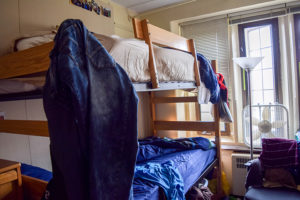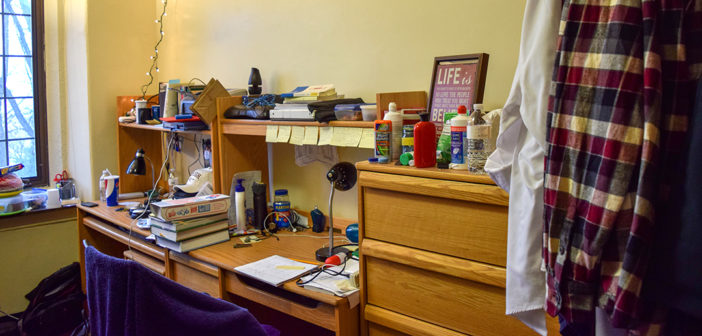
Beds are bunked in a forced double on Nov. 19, 2015, in Richards House. Forced doubles are rooms less than 150 square feet, according to Ozzie Breiner, the director of Residential Services. (Roshan Giyanani/B&W Staff)
Small rooms with extra roommates are not uncommon at Lehigh. In some cases, the lack of space on campus leads to forced doubles, triples and quads.
“We have ‘x’ amount of spaces for first-year students and when our friends over in Admissions bring in a few more first-year students than we have spots for, we are forced to over occupy rooms,” said Ozzie Breiner, the director of Residential Services.
Breiner said over-occupied residence halls differ from over-occupied Greek houses, because Greek students choose their constituency and over occupy their rooms to keep both sophomores and juniors living in the house. The rooms in Greek houses were built as doubles, he said, but have since been designated as singles because they are small spaces.
Breiner said students receive compensation if they are asked to live in an over-occupied room.
“If you’re living (in) a space that is over occupied, we offer a 10 percent discount for that semester,” Breiner said. This discount is applied as a reimbursement to students’ bursar accounts.
This year, there are only seven first-year students living in over-occupied rooms, while in previous years there have been more than 100, Breiner said.
He said while over occupying rooms is not ideal, it is important to give students the opportunity to live on campus.
“If we couldn’t house (students), they would be forced to find housing off-campus and if they want to live here, then we want to be able to offer them that opportunity,” Breiner said.
The minimum square footage for a double at Lehigh is 150 square feet, but some rooms that were originally doubles are just under that standard, at about 138 square feet, Breiner said. These rooms are used as forced doubles. The room standards do not come from a Bethlehem city regulation, but have been adopted over time at Lehigh.
This Lehigh standard for a double room is much larger than that of the city of Bethlehem. According to Article 1733 of Bethlehem city ordinance, section 404.4, every bedroom with one resident requires 70 square feet of floor space. Bedrooms with multiple occupants require at least 50 square feet per resident.
Jacqueline Brand, ’18, a member of Kappa Delta, has lived in an over-occupied room for the past two years. Last year, she lived in a larger room with five residents and this year she lives in a double, which has been converted to a triple.
“Getting adjusted to (the space) was kind of difficult,” Brand said. “I’ve learned to adapt to it. Last year, I had more trouble with the space.”
Brand said it was difficult living with four other students because they needed to get ready for class at the same time, and the additional beds, desks and wardrobes were obstacles.
Brand said she received the reimbursement from Residential Services both years and the money was deposited directly into her bursar account.
“It’s nice to know my parents are getting a discount,” she said.
Brand said while living in such a tight space can be a hassle at times, she hasn’t had any issues getting along with her roommates.
Some students are fortunate enough to get along with their roommates in close quarters, but there are other implications of living in over-occupied rooms.
“From my public health background, my first reaction (to over-occupied rooms) is that students are more likely to spread germs to each other,” said Peter Costa, the director of Health Advancement & Prevention Strategies.
Infections such as the common cold and the flu affect students and their academic success the most, he said. Stress and anxiety about daily routines and the lack of space can also affect academic performance.
Sleep habits amongst students are poor across the country, Costa said, but could be worsened in over-occupied rooms due to the close quarters and varying sleep schedules.
According to a survey conducted by Health Advancement & Prevention Strategies last year, Lehigh students typically do not experience roommate difficulties. Only 3.6 percent of students listed roommate difficulties as an obstacle to their academic success. This is lower than the national average of 6.5 percent, Breiner said.
Costa said Health Advancement & Prevention Strategies has found the bathroom installment posters to be the most effective way to reach students about health issues. The Peer Health Advisers also hold events, such as one focused on preventing the spread of the common cold and flu, which could be particularly relevant to students in forced living situations.
If a student is encountering problems with his or her roommate, Costa recommends talking to a Gryphon or visiting the Dean of Students Office.






Comment policy
Comments posted to The Brown and White website are reviewed by a moderator before being approved. Incendiary speech or harassing language, including comments targeted at individuals, may be deemed unacceptable and not published. Spam and other soliciting will also be declined.
The Brown and White also reserves the right to not publish entirely anonymous comments.
2 Comments
The pictures remind me of my room in Richards in 1964. The guard on the upper berth is an improvement; I don’t remember one having been there in the 60’s. Thankfully I had the lower level bed. I remember the control of temperature and ventilation to have been more problematical than the size of the room.Can I apply retroactively for my 10% discount?
Pingback: Over-occupancy in dorm rooms raises health concerns – Matthew Cossel